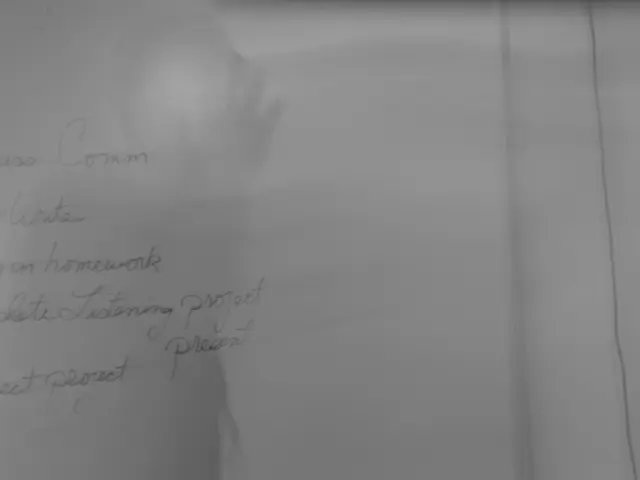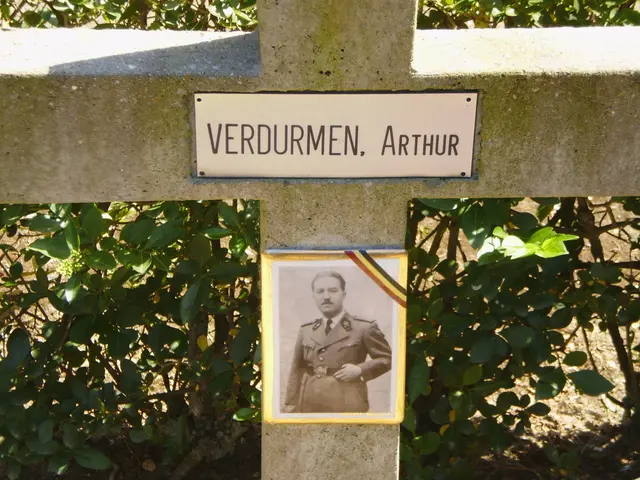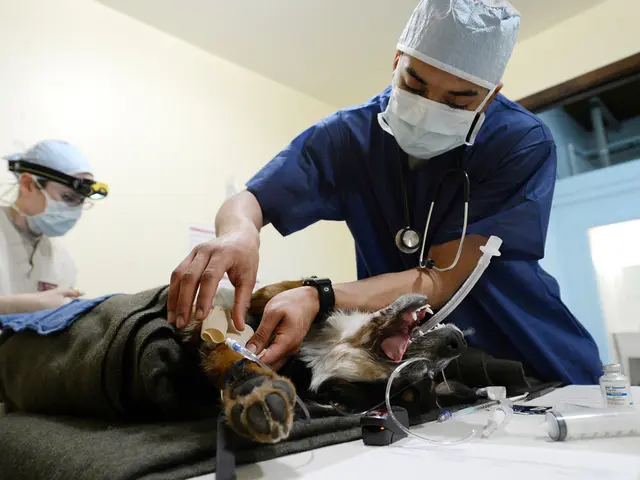Bayer's Battles: Drowning in Glyphosate Lawsuits, Navigating Between Hope and Peril
Bayer finds itself in a dilemma between adversity and optimism.
*Facebook **Twitter **WhatsApp **Email **Print* **Copy Link
Bayer finds itself in the thick of it, with its market worth tumbling from a peak of 120 billion euros in 2015 to a mere 22 billion today. The source of the storm? The infamous "Monsanto fiasco." During the annual meeting, new CEO Bill Anderson squeezed out little optimism from his unsmiling mug.
The glyphosate legal maelstrom that's been battering Bayer for years isn't showing any signs of abating, and Anderson, two years into his tenure, isn't holding out much hope for relief anytime soon. Shareholders, nonetheless, approved a possible multi-billion-euro capital increase, potentially paving the way for a settlement with plaintiffs - and a glimmer of hope that the legal quagmire might end.
As Marc Tüngler, the main business manager of the German Shareholder Protection Association (DSW), articulated at the virtual hootenanny, shareholders are trapped between "hell and hope." Hell, as he puts it, when gazing at their depleted portfolios, and hope for deliverance from the "Monsanto disaster."
Anderson swore that the board was hustling nonstop to restore Bayer to a lucrative growth trajectory. Their master plan is to reduce legal risks drastically by the end of 2026. Contrasting 2020, Bayer intends to stand on its own two feet, without relying on a special settlement to deter future claims.
The strategy to salvage its soul? A multi-faceted approach such as another attempt at the Supreme Court and attempts to secure regulatory certainty in the labeling of plant protection products in the US. No definitive plans have been hatched for the newly sanctioned capital, but it'll undoubtedly offer "vital wiggle room" to manage the legal wrangling.
Is Glyphosate Set to Disappear?
Bayer has already parted with approximately $10 billion to settle disputes, setting aside around $5.9 billion for further payouts by the end of 2024. In their crusade to lay the glyphosate chronicles to rest, Anderson doesn't dismiss the notion of jettisoning the business with the herbicide in the U.S.
"We might be forced to abandon marketing this critical product if the plaintiff industry keeps pushing," Anderson warned, though no concrete plans for this have been drawn up as of yet.
Recognized shareholder experts ISS and Glass Lewis, along with major German fund firms, supported the proposal for a 35% share capital increase. Hendrik Schmidt of the DWS fund company expressed support, expressing hope that the Monsanto chapter for Bayer could finally be written out of the ledger.
As Ingo Speich, head of sustainability and corporate governance at Deka Investment, pointed out, shareholders have no choice but to approve the ballooning bill due to weak cash flow, high debt, and operational uncertainties. The heat, therefore, is on Anderson to deliver.
"Even for Bayer, 2024 was a bloodless business year," remarked DWS expert Schmidt. The profit plummeted by 14 percent, and the stock price languished behind the Dax by a full 60 percent. Bayer surrendered its position as the largest German pharmaceutical company to Boehringer. "We're starting to wonder if Bayer is ceding its claim to dominance." According to Speich, the company is "becoming a pale shadow of its former self."
The Leverkusen-based firm is at breaking point. In 2015, its market value touched 120 billion euros, but today, it's languishing at approximately 22 billion - a fraud of the 63 billion dollars Bayer plunked down for glyphosate developer Monsanto nearly seven years ago. The acquisition brought a deluge of lawsuits in the US over allegations of the herbicide's carcinogenic effects. The unending legal battles are still hanging over the company like a millstone. The red ink now runs over 32 billion euros.
Bayer hails 2024 as a "watershed year" for its pharmaceutical division, with Anderson focusing on implementing a new organizational structure to slash bureaucracy and streamline the outfit, in tandem with significant job cuts, particularly in management. He has ruled out splitting the company into its three divisions - Pharma, Crop Science, and consumer health products. "Our attention remains focused on tackling our predicaments," he declared. This "not yet" shouldn't be read as "never."
- Bayer
- Monsanto
- Glyphosate
- Stock prices
- Dax company
- Pharmaceutical industry
**Enrichment Data:**
Overall: Bayer continues to grapple with significant legal and financial challenges from glyphosate-related lawsuits, with recent developments highlighting escalating risks:
Litigation Scope and Settlements As of January 2025, Bayer has resolved or dismissed 114,000 of approximately 181,000 claims, leaving 67,000 pending[1]. The company has paid over $10.9 billion in settlements, including a $2 billion reserve for future claims[5]. Recent verdicts like the $2.065 billion Georgia jury award (April 2025) demonstrate persistent liability risks, though these are subject to appeals[5][1].
Legal Strategy Bayer is pursuing a multi-pronged approach:- Supreme Court petition: Filed in April 2025 seeking immunity under FIFRA, arguing federal pesticide law preempts state-level liability claims[1][4].- State lobbying: Actively pushing legislation (e.g., in Georgia) to block cancer-related lawsuits against pesticide manufacturers[3][1].- Product reformulation: Removed glyphosate from U.S. consumer products in 2023 while maintaining industrial sales[1].
Financial and Operational Impact The litigation has forced Bayer to warn that ongoing lawsuits could threaten glyphosate's availability for industrial agriculture, a critical component of U.S. commodity crop production[1]. Conventional farming groups support Bayer's efforts, fearing supply chain disruption if glyphosate becomes commercially unviable[1][3].
Future Outlook Success in Supreme Court or state legislatures could substantially reduce liability exposure. However, failure risks prolonged litigation costs and potential shifts in agricultural practices away from glyphosate-dependent systems[1][3]. The 9th Circuit Court's pending decision on expiration label claims (March 2025) represents another potential liability vector[5].
- Bayer's CEO Bill Anderson, in the midst of navigating glyphosate lawsuits, expressed a lack of immediate hope for relief from the legal maelstrom that has plagued the company for years.
- Despite the persistent legal battles, shareholders approved a potential multi-billion-euro capital increase, offering "vital wiggle room" to manage the legal wrangling.
- Anderson stated that Bayer's board is working tirelessly to restore the company to a lucrative growth trajectory, aiming to reduce legal risks significantly by the end of 2026.
- The company's strategy to salvage its reputation includes another attempt at the Supreme Court and attempts to secure regulatory certainty in the labeling of plant protection products in the US.
- Bayer has already set aside $10 billion to settle disputes, with an additional $5.9 billion reserved for future payouts by 2024, and there's a possibility that the company may abandon marketing glyphosate in the US if the plaintiff industry continues to push.
- Recognized shareholder experts support the proposal for a 35% share capital increase, with Hendrik Schmidt of the DWS fund company expressing hope that the Monsanto chapter for Bayer could finally be written out of the ledger.








